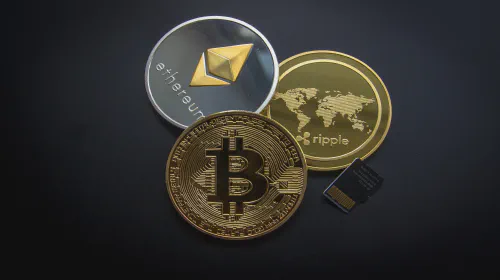Blockchain in Fintech: Decentralized Technology Reshaping Finance
Salomon Kisters
Jul 17, 2023This post may contain affiliate links. If you use these links to buy something we may earn a commission. Thanks!
At our company, we understand the importance of staying up-to-date with the latest technologies in the finance industry.
One such technology that has gained significant traction in recent years is blockchain.
In this blog post, we will delve into the world of blockchain in fintech, explaining what it is, how it works, and its potential applications in the finance sector.
What is Blockchain?
Blockchain is a decentralized digital ledger that securely records and verifies transactions. In simpler terms, it is a chain of blocks, where each block contains a list of transactions. What sets blockchain apart from traditional databases is its distributed nature. Instead of having a central authority or server to manage and validate transactions, blockchain relies on a network of computers (nodes) that collectively maintain and update the ledger.
How Does Blockchain Work?
To understand how blockchain works, it is essential to grasp the concept of a decentralized consensus algorithm. The most commonly used consensus algorithm in blockchain is called Proof of Work (PoW). In PoW, nodes compete to solve a complex mathematical puzzle, and the first one to solve it gets to add a new block to the chain. This process requires a significant amount of computational power, making it difficult for any single entity to control the network.
Once a new block is added to the chain, it is linked to the previous block through a cryptographic hash function. This creates an immutable chain of blocks, where altering any transaction in a previous block would require changing subsequent blocks, making it practically impossible to tamper with the data recorded on the blockchain.
Advantages of Blockchain in Fintech
Improved Security and Transparency
Blockchain technology enhances security by eliminating the need for a single, vulnerable central authority. Since the entire network verifies and stores each transaction, it is nearly impossible for fraud or hacking attempts to go unnoticed. Additionally, blockchain’s transparent nature allows for greater visibility and accountability, as anyone with access to the network can view and audit transactions.
Increased Efficiency and Speed
Traditional financial transactions often involve intermediaries, such as banks or clearinghouses, which can cause delays and incur additional costs. By leveraging blockchain, financial processes can become more streamlined, eliminating the need for intermediaries and reducing transaction times. Moreover, smart contracts, which are self-executing agreements stored on the blockchain, can automate and expedite various financial operations.
Cost Reduction
Blockchain has the potential to significantly reduce costs in the finance sector. By removing intermediaries and automating processes, financial institutions can streamline their operations and cut down on administrative expenses. Additionally, blockchain’s transparent nature reduces the need for audits and reconciliation, further reducing costs for businesses.
Enhanced Accessibility
Blockchain technology has the potential to provide financial services to underserved populations who may not have access to traditional banking systems. With a smartphone and internet connection, individuals can participate in blockchain networks and access various financial services, such as payments, remittances, and lending, without relying on traditional financial institutions.
Improved Data Management and Privacy
Blockchain enables individuals to have greater control over their personal data. Instead of entrusting their data to third-party organizations, users can store and manage their information on the blockchain, granting access only to those entities they choose to transact with. This increased control over data promotes privacy, reduces the risk of data breaches, and puts individuals in charge of their own information.
Real-world Applications of Blockchain in Fintech
Payments and Remittances
Blockchain technology can revolutionize the way we make payments and send money internationally. By leveraging cryptocurrencies, such as Bitcoin or Ethereum, individuals can transfer funds directly to each other without the need for intermediaries or lengthy settlement times.
Trade Finance and Supply Chain Management
Blockchain provides an efficient and transparent way to manage trade finance and supply chain processes. By recording and verifying transactions on the blockchain, businesses can streamline documentation, track goods in real-time, and mitigate fraud or counterfeiting risks.
Identity Verification and KYC
Blockchain’s secure and decentralized nature makes it an ideal candidate for identity verification and know-your-customer (KYC) processes. Instead of relying on physical documents or centralized databases, individuals can store their identity information on the blockchain and grant access to authorized parties when needed, reducing the risk of identity theft and fraud.
Crowdfunding and Lending
Blockchain-based crowdfunding platforms allow individuals and businesses to raise funds directly from investors, bypassing traditional intermediaries. This not only democratizes access to capital but also reduces costs and increases transparency for both fundraisers and investors. Additionally, blockchain-based lending platforms enable peer-to-peer lending, providing individuals with easier access to loans at competitive interest rates.
Insurance
Blockchain technology can transform the insurance industry by streamlining claims processing, reducing fraudulent activities, and automating policy management. Smart contracts can be used to trigger automatic claims payouts based on predefined conditions, eliminating delays and providing faster and more efficient service to policyholders.
Conclusion
As blockchain technology continues to evolve, its potential to revolutionize the finance industry becomes increasingly apparent.
From improved security and transparency to increased efficiency and cost reduction, blockchain offers numerous benefits that can reshape the way financial transactions are conducted. With real-world applications ranging from payments and trade finance to identity verification and insurance, blockchain is poised to transform fintech and empower individuals with greater control over their financial lives.
Embracing this technology now will position businesses and individuals for a future of innovation and opportunity.
Stay informed with the latest insights in Crypto, Blockchain, and Cyber-Security! Subscribe to our newsletter now to receive exclusive updates, expert analyses, and current developments directly to your inbox. Don't miss the opportunity to expand your knowledge and stay up-to-date.
Love what you're reading? Subscribe for top stories in Crypto, Blockchain, and Cyber-Security. Stay informed with exclusive updates.
Please note that the Content may have been generated with the Help of AI. The editorial content of OriginStamp AG does not constitute a recommendation for investment or purchase advice. In principle, an investment can also lead to a total loss. Therefore, please seek advice before making an investment decision.

DeFi Tokens vs. Coins - What is the Difference?
DeFi is everywhere. But what are DeFi tokens, and how are they different from coins?

Ethical Concerns in Digital Marketing Practices - Exploring Privacy, Transparency, and Manipulation
Discover the ethical dilemmas in digital marketing practices, from invasion of privacy to misleading advertising and manipulation of consumer behavior. Learn more here.

Top Quantum Computing Companies | Leading the Future of Quantum Technology
Discover the top quantum computing companies leading the future of quantum technology, from IBM and Google to Microsoft, Rigetti Computing, and D-Wave Systems.
Protect your documents
Your gateway to unforgeable data. Imprint the authenticity of your information with our blockchain timestamp